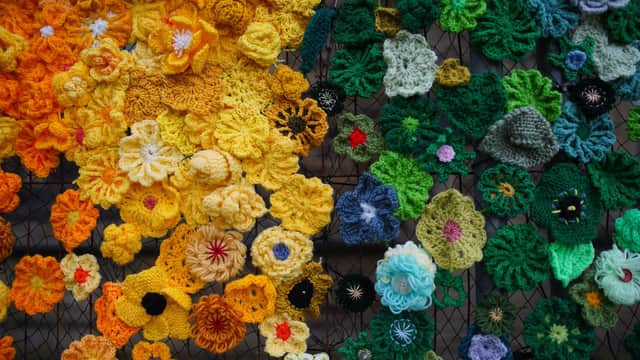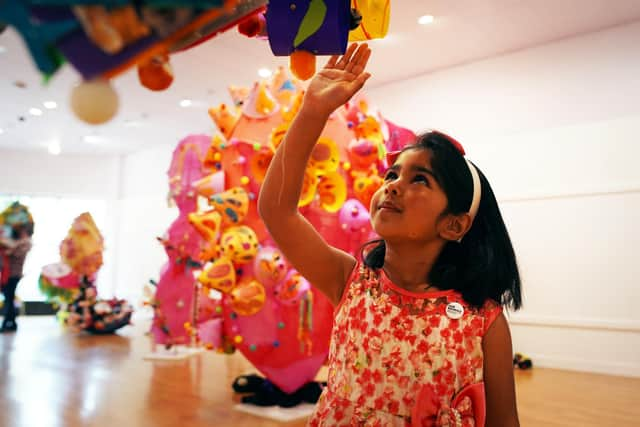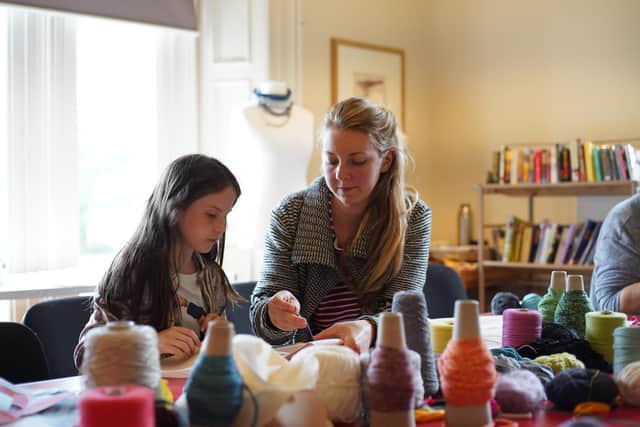Woven: The festival celebrating the textile industry in Kirklees


It was a way to mark generations of innovators, connecting the area’s humble beginnings in domestic spinning and weaving, to large-scale mill production, and the industrial developments of the modern day.
When the biennial festival returns to the district for its third edition tomorrow, it will also be about looking to the future.
Advertisement
Hide AdAdvertisement
Hide AdDeveloped, organisers say, from an “urgent need to highlight the environmental impact of textiles on the planet”, this year’s festival will have sustainability at its heart, with events exploring the two core strands of growing and sewing, as well as technological advancements and the various steps that people can take to reduce their own waste.
“We’re in a pretty dire position in terms of the planet,” says curator Natalie Walton. “It’s the biggest issue that we’ve got and the thing we can do small things to change.
“We’re a fast consumer society - buy it, it goes out of trend, chuck it away - and everything that goes into landfill is destroying the planet.”
One of the festival projects, Mission to Mend, is focused on teaching textile repair skills to support a more sustainable outlook of ‘buying once, buying well’ for future generations.
Advertisement
Hide AdAdvertisement
Hide AdA series of hand sewing workshops, funded by the National Heritage Lottery Fund, will take place across five locations – in Golcar, Meltham, Mirfield, Holmfirth, and Heckmondwike - and will be followed by a repair roadshow that celebrates local sewing talent, including community needlecraft groups.


“Waste is prevalent in every part of the fashion and textiles industry, as a result of overproduction, overconsumption and problematic end-of-life solutions,” event organisers says.
“The pressure is mounting on fashion brands and textile companies to lower their impacts on people, the planet, and animals. But we, as consumers and global citizens, also have an important role to play.”
People are also invited to play their part by getting involved in the festival’s Growing Colour Together Movement to create natural dye gardens across the district.
Advertisement
Hide AdAdvertisement
Hide AdNatural dyes are colourants derived from plants and other biological sources, rather than chemicals.


“We’ve got incredible artists who are growing and making natural dyes in Kirklees who have been completely overlooked really,” Natalie says.
Growing Colour Together aims to involve the local community in natural dyeing and to turn Kirklees into the UK’s largest ever dye garden. Artists have been working with communities in Birkby and Fartown, Dewsbury and Kirkburton on the project and a programme of events is taking place as part of the festival, including an eco-printing workshop to teach people how to transfer colour from flowers and leaves onto fabrics and a foraging walk for natural dyes.
“Underpinning these events is conversation around natural dyes versus chemical dyes,” Natalie says, helping to highlight the environmental implications of the latter.
Advertisement
Hide AdAdvertisement
Hide AdThis year’s festival, funded by Kirklees Council, launches on June 3, with STRUT, a free one-day event taking place outside Dewsbury Town Hall centring around a community catwalk.
The catwalk will see groups, students and community members celebrating their individuality in their own handmade designs, embellishments and accessories. The event will also feature a music stage presented by Kirklees Year of Music, a pop-up skate park, and textile crafting opportunities.
A programme of more than 100 free and ticketed events will then run until July 9. Closing the festival is Textile Futures, a two-day event featuring a series of talks, workshops and meet and greets, exploring the latest innovations and trends in the world of textiles, as well as the career opportunities the industry can offer to young people.
“It’s about dispelling the myth that it’s all automated and no one works in the industry,” Natalie says. “There are fantastic jobs in the industry and they’re very forward looking.
Advertisement
Hide AdAdvertisement
Hide Ad“Yes, it is one of the most polluted industries globally but a lot of hard work is being done to minimise that and the next generation could be the key to that.”
Of the varied programme, 36 events are led by the Woven team, 11 by local businesses, and the rest by the community.
“The community comes out and puts on its own events and activities - and it will yarn bomb all over the place,” says Natalie. “Yes we curate the festival and pull together themes and strands and activities but the community really takes it and runs with it, it’s brilliant.”
For details of all the festival events, visit woveninkirklees.co.uk
